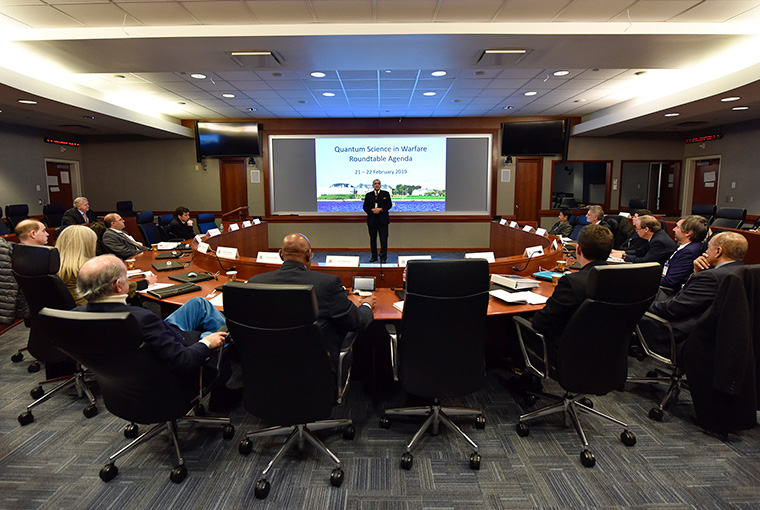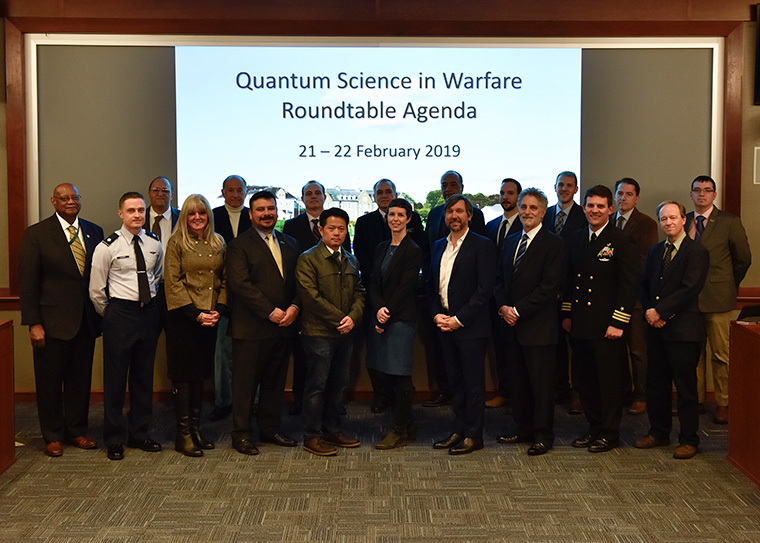U.S. Naval War College holds public-private forum on defense applications for quantum science

NEWPORT, R.I. -- U.S. Naval War College gathered military and civilian leaders in science and technology for a workshop focused on how quantum science might shape the future of national defense.
“We’re on the threshold of the next great scientific revolution,” said Lewis Duncan, college provost and a space physicist by training.
“I believe quantum physics -- and the applications that flow from it -- represent the next great revolutionary moment in the development of science and technology. That’s why we are here today,” he told the group.
The Quantum Science in Warfare roundtable on Feb. 21 and 22 was the second event in what college leaders said they want to be a continuing conversation, with additional gatherings throughout the year.
Quantum science: The field of science that deals with the behavior of matter and energy at the smallest atomic and subatomic levels. Quantum engineering could lead to new techniques that solve problems in ways that can’t be addressed by existing technology.
Attendees included engineers from the Naval Undersea Warfare Center and SPAWAR Systems Center Pacific in addition to representatives from quantum-related technology companies such as Vancouver, British Columbia-based D-Wave, Zapata Computing in Cambridge, Massachusetts, and Entanglement Institute in Newport. The civilian education sector was represented by the University of Chicago’s Chicago Quantum Exchange.
Roundtable organizers said they hope to identify a group of researchers who can collaborate on quantum physics advances that can be applied to a range of national security and military needs.
Display of credible combat power is the way that the United States deters potential enemies, said Will Bundy, the college’s associate provost for warfighting research and development and the conference co-coordinator.
“What that requires of us is that we have networks and computing capability superior to our adversaries. Right now, we have to think hard about that,” he told roundtable members.
Bundy said that the National Defense Strategy calls for the United States to lead in what has become a major-power competition among nations – a competition being driven by the accelerating adoption of technology.
Cmdr. Michael Riordan, who teaches in the college’s Ethics and Emerging Military Technology program, was co-coordinator of the event.
Kate Timmerman, executive director of Chicago Quantum Exchange, told the group that this is an exciting time for work on quantum science.
“Everyone in the room understands where we are with the opportunity,” Timmerman said. “There have been some significant technological advances that allow us to not only better understand the fundamental principles of quantum physics but also to harness the principles for a variety of applications.”
Her nearly 2-year-old organization -- which includes the University of Chicago, the University of Illinois Urbana-Champaign and the U.S. Department of Energy’s Argonne National Laboratory and Fermi National Accelerator Laboratory -- is dedicated to breaking down institutional barriers on quantum science.
Naval War College officials asked the guests to talk about current projects, demonstrated progress, applications, future planning and what might have the potential for disruptive change.
D-Wave Government President René Copeland told a story about how British online supermarket Ocado used his company’s quantum computing power to calculate how to best program 1,100 robots moving several meters per second to fill incoming grocery orders.
“You think about the routing of the robots in the grocery example,” Copeland said. “You could make an argument that that could be modified for a number of logistics problems that might be suitable for something the Navy is doing.”
Other speakers addressed their research and prospects for delivering quantum-based technology.
Bundy said this roundtable will be followed by invitations to join a research network that will collaborate on adopting quantum technology for dual use in business and defense.
 U.S. Naval War College hosted the first Quantum Science in Warfare roundtable Feb. 21-22, 2019. Quantum information science academics and industry thought leaders gathered to examine how quantum physics theories can be applied to future fleet functional and operational capabilities. Continuing initiatives, investments and demonstrations in the field of quantum physics have shown the potential to transition scientific research into technology that will address warfighting challenges.
U.S. Naval War College hosted the first Quantum Science in Warfare roundtable Feb. 21-22, 2019. Quantum information science academics and industry thought leaders gathered to examine how quantum physics theories can be applied to future fleet functional and operational capabilities. Continuing initiatives, investments and demonstrations in the field of quantum physics have shown the potential to transition scientific research into technology that will address warfighting challenges.(U.S. Navy photo by Jaima Fogg/released)
